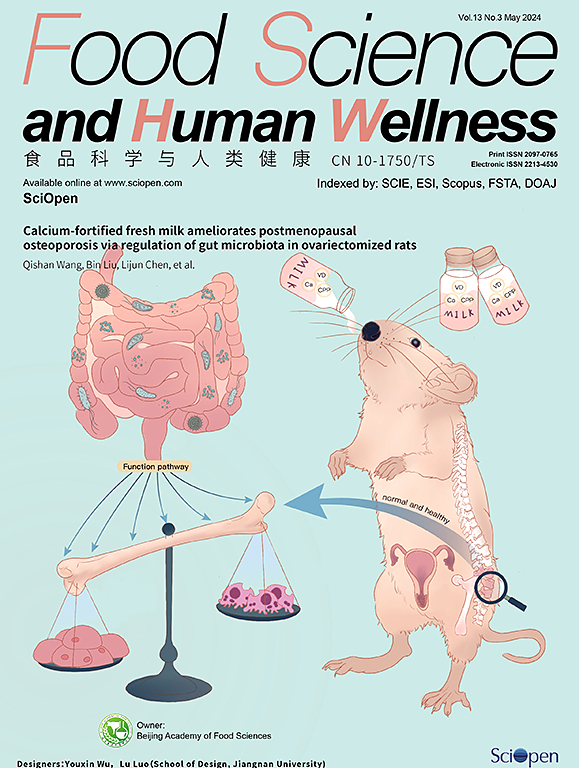饲料添加剂乙氧基喹对罗非鱼生长性能的影响及对消费者的潜在次生危害
IF 7.4
1区 农林科学
Q1 FOOD SCIENCE & TECHNOLOGY
引用次数: 0
摘要
乙氧基醌(EQ)是一种广泛应用于水产养殖的饲料添加剂,但其对鱼类和消费者的潜在危害尚不完全清楚。本研究将EQ应用于饲喂高脂或低脂饲料的罗非鱼,观察转基因养殖罗非鱼生长性能和肠道屏障完整性的变化。此外,通过16S rDNA测序分析肠道内容物和肉中的微生物群,并通过LC-MS/MS非靶向代谢组学测定肉中的代谢物。在低脂组中,EQ提高了增重和饲料转化率,但降低了存活率。高脂组仅增重下降,对饲料转化率和成活率无显著影响。此外,在两种饲养条件下,肠道绒毛和微生物群多样性均受到损害。微生物群分析表明,EQ导致肉菌群组成不同,多样性降低,潜在致病菌比例上调。EQ也改变了肉代谢组,减少了有益的代谢物,增加了潜在的有害成分。本研究阐明了EQ对罗非鱼生长性能的影响,暗示EQ对罗非鱼有不良影响,并可能传递给消费者。本文章由计算机程序翻译,如有差异,请以英文原文为准。
The effect of feed additive ethoxyquin on tilapia growth performance and potential secondary hazard to consumers
Ethoxyquin (EQ) is a widely used feed additives for aquaculture, but the potential hazard to fish and consumers are not fully understood. In this work, EQ was applied to tilapia fed with either high-fat or low-fat feed, and the changes in growth performance and intestinal barrier integrality of genetically improved farmed tilapia was observed. Additionally, the microbiota in the intestinal content and flesh was analyzed by 16S rDNA sequencing, and the flesh metabolites was measured by LC-MS/MS untargeted metabolomics. In the low-fat group, EQ increased weight gain and feed conversion rate, but reduced survival rate. In the high-fat group, only weight gain decreased, and there was no significant effect on feed conversion rate and survival rate. Additionally, the intestinal villi and microbiota diversity was impaired in both feeding conditions. Microbiota analysis revealed that EQ resulted in different composition and lower diversity of the flesh microbiota and upregulated the proportion of potential pathogens. EQ also changed the flesh metabolome, decreasing beneficial metabolites and increasing potential harmful components. This work elucidated the effect of EQ on growth performance of tilapia and implied that it has adverse effects on tilapia and may be passed on to consumers.
求助全文
通过发布文献求助,成功后即可免费获取论文全文。
去求助
来源期刊

Food Science and Human Wellness
Agricultural and Biological Sciences-Food Science
CiteScore
8.30
自引率
5.70%
发文量
80
审稿时长
28 days
期刊介绍:
Food Science and Human Wellness is an international peer-reviewed journal that provides a forum for the dissemination of the latest scientific results in food science, nutriology, immunology and cross-field research. Articles must present information that is novel, has high impact and interest, and is of high scientific quality. By their effort, it has been developed to promote the public awareness on diet, advocate healthy diet, reduce the harm caused by unreasonable dietary habit, and directs healthy food development for food industrial producers.
 求助内容:
求助内容: 应助结果提醒方式:
应助结果提醒方式:


